Best Type Of Doctor For Neck Pain
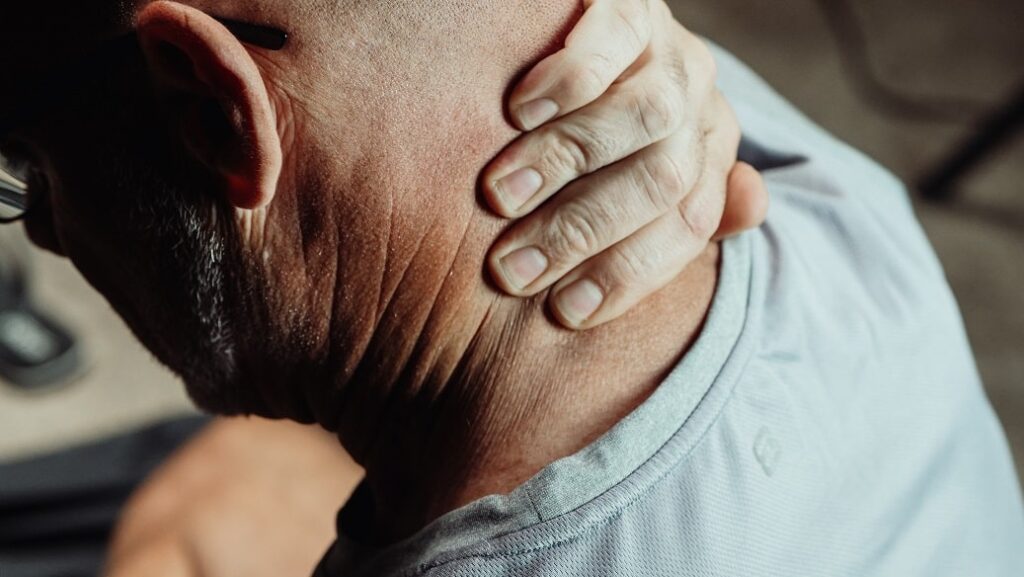
Houston Chiropractor Comments: When I am out of the office, people will ask me what the best type of doctor is for neck pain. They think that I will say that it is always a doctor of chiropractic (DC), but they are surprised with my answer.
The best type of doctor for neck pain depends on the type of neck pain.
For a simple achy pain, such as after driving several hours or spending too much time on the computer, the best type of doctor is … none. This sort of pain will typically resolve on its own. If need, you can put ice or heat (Ice Vs Heat for Injuries – Beecher Chiropractic – YouTube) on it for 20 minutes or do your neck stretches (Neck Stretches – Beecher Chiropractic – Ward Beecher DC – YouTube).
If you are having severe neck pain caused by muscle spasms that do not allow you to move your neck at all, then you should see a medical doctor. This sort of problem needs to be co-managed with medication so that the muscles can be relaxed enough so that the neck can be adjusted by a doctor of chiropractic. Luckily, most medical doctors are now willing to work with us for the benefit of their patients. Several have become patients after seeing the benefit of our care. With the appropriate muscle relaxers and anti-inflammatory medication, the muscle will relax enough for the chiropractor to fix the cause of the problem.
For most neck pain, a chiropractor is the best doctor to get quick relief. Neck, along with low back pain, are the two most common conditions that doctors of chiropractic treat. As a result, most chiropractors treat several hundred patients a year with neck pain with excellent results. You can get relief without the harmful side-effects of drugs and you can actually fix the cause of the problem with spinal adjustments and therapy.
Dr. Ward Beecher practices at Beecher Chiropractic Clinic at 1001 Pineloch, Ste 700 Houston, TX 77062. You can schedule an appointment at www.BeecherChiropractic.com or by calling (281) 286-1300. If you have any questions regarding this blog, please comment below!
Prevalence of Neck Pain
Got Neck Pain?
Does your neck hurt a lot? Does neck pain keep you from activities that you love? It’s always good to know that you’re not alone. In fact, neck pain is the third most common chronic pain condition experienced by adults in the United States. Not only does the pain impact your physical life, but it also impacts you in other ways.
Social Consequences of Neck Pain
When your neck hurts, you may not feel like going out as much. In fact, if you’re having a really bad day, you may not get out of the house at all. This limits the social engagements that you can commit to and enjoy. Over time, your neck pain may keep you more isolated than you prefer to be, and it may keep you from participating in activities that you love.
Neck pain can also make you grumpy and difficult to live with, which can impact all of your relationships. Whether you’re at home or at work, you want to have positive interactions with the people around you. This can be hard when you’re in constant pain.
Psychological Consequences of Neck Pain
Any kind of long-term chronic pain impacts the way you think and feel about yourself and your life. Over time, you may begin to thin of yourself as weak and tired, for instance, rather than as strong and capable. These can wear away at your self-esteem and self-image, causing you to feel badly about yourself and what you can do.
Long-term pain can also contribute to depression and anxiety. If you hurt all the time and it doesn’t get better, you may gradually lose interest in a life you once loved. When you can’t do many of the things you love to do, it’s easy to get discouraged and feel hopeless. And when you never know how badly things are going to hurt, it’s easy to get caught up worrying about when your pain might strike again.
Well-Being Consequences of Neck Pain
When you hurt all the time, you don’t feel great about your life and you can’t do as much. Over time, this wears away at your sense of well-being. Even if you are positive and try to stay engaged in your life, chronic neck pain is discouraging and that takes its toll. Most people find that they aren’t as happy when they hurt a lot.
Treating Neck Pain
One of the most promising ways to treat neck pain is through chiropractic work. Chiropractors all receive at least 7 years of post-graduate training, and much of that time is spent focusing on the neck. Through various techniques, they can treat many kinds of neck pain without medications or surgery.
Even if you feel like you’ve tried everything for your neck pain, chiropractic could help you. Call us for a consultation and we’ll let you know what is going on with your neck and how we can help you to feel better and live better! You may be able to get back to the life you love sooner than you had thought possible.
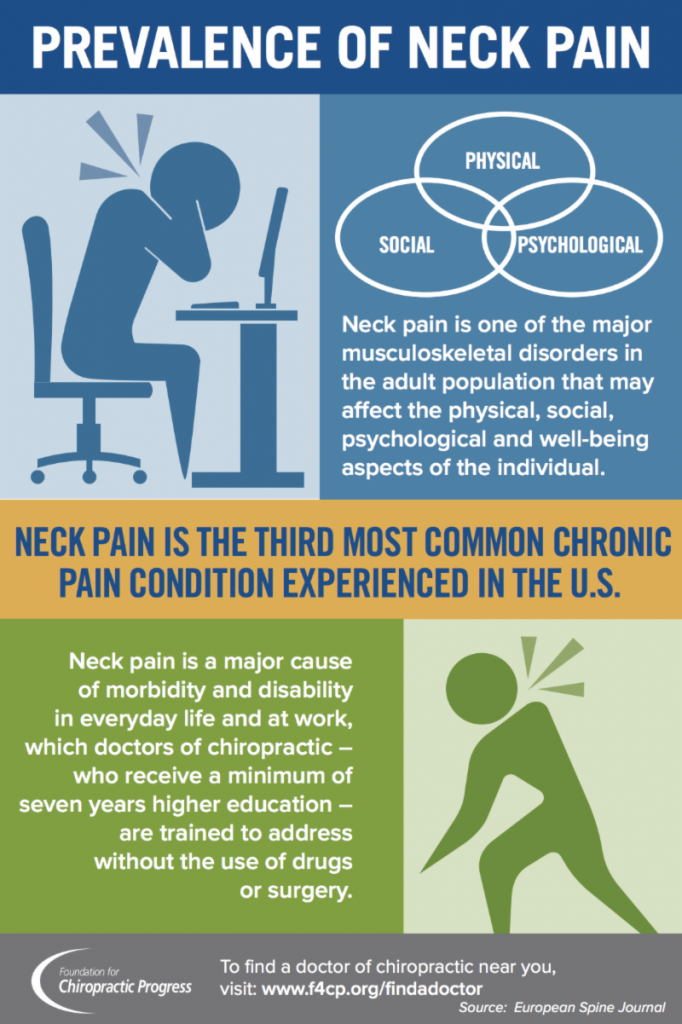
Can Whiplash Affect My Memory?
Houston Chiropractor Comments on MTBI:
This is a common complaint we hear as a Houston chiropractor occurring as a result of a whiplash injury, but it’s not commonly known, leaving those who are suffering wondering, “…what’s wrong with me?” Whiplash is an injury that classically occurs as a result of a car crash at any speed, even at low speed! This is because at low speed, there is little to no damage to the car, and the forces from the crash are not absorbed by the crushing metal. As a result, those forces are transferred to the contents inside the car – that is, the passengers. This sometimes results in a significantly greater injury compared to crashes that occur at twice the speed because the latter results in crushing metal. The actual injury that occurs in whiplash is caused by the sudden, rapid movement of the head resulting in varying degrees of injury to the neck, as well as to the contents inside the skull – that is, the brain. The brain literally “bangs” into the inside walls of the skull when the head is rapidly accelerated during a car crash. The resulting injury is a concussion. What’s interesting is that most patients injured in a car crash often don’t mention a concussion nor is it usually asked about at the doctor’s office as other, more obvious injuries are dwelt with. The condition is usually referred to by one of two names: post-concussive syndrome or mild traumatic brain injury (MTBI).
Suffering From Whiplash and MTBI
This can be very embarrassing, frustrating, and scary for patients suffering with MTBI. Other symptoms associated with this include difficulty in focusing (blurred vision), headaches, having difficulty in pronouncing certain words (“tongue twisted”), having difficulty in understanding what was said, difficulty remembering numbers or groups of numbers like phone numbers, addresses, birthdates, and so on. These symptoms can range from mild to severe and can be very disruptive, making work and everyday tasks challenging.
How long does it last? MTBI can completely clear up in 2 to 6 months without problems or, it can hang on for 2 years or longer, and may even become a permanent residual from the car crash. In one study, continued problems after a 2 year time frame were reported in close to 20% of those injured 2 years earlier. This study suggests that about 1 out of 5 may continue to suffer with MTBI and the associated brain-related problems for at least 2 years following a car crash. However, another study reported the long term “higher cognitive function” (such as the ability to communicate through written or spoken language) is usually not affected by whiplash injuries. However, they preface that with by reporting that a more commonly injured group with more mild brain problems was found.
As chiropractors, we are trained to do a thorough history, orthopedic and neurological examination, and ask specific questions about mild traumatic brain injury. It is important to discuss this information with those suffering from whiplash injuries as frequently, MTBI patients think something is “…seriously wrong” and harbor unnecessary anxiety.
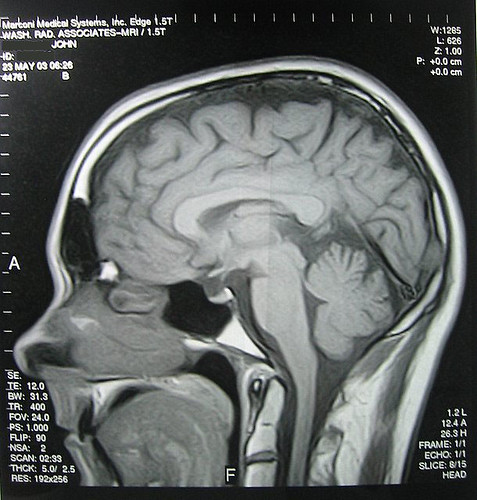
We realize that you have a choice in where you choose for your healthcare services. If you, a friend or family member requires care for MTBI whiplash, chiropractic rehabilitation & care is a logical first choice and we would be honored to offer our services to you.
Dr. Ward Beecher practices at Beecher Chiropractic Clinic at 1001 Pineloch, Ste 700 Houston, TX 77062. You can schedule an appointment at BeecherChiropractic.com or by calling (281) 286-1300. If you have any questions regarding this blog, please comment below!
Chiropractic and Opioid Prescriptions
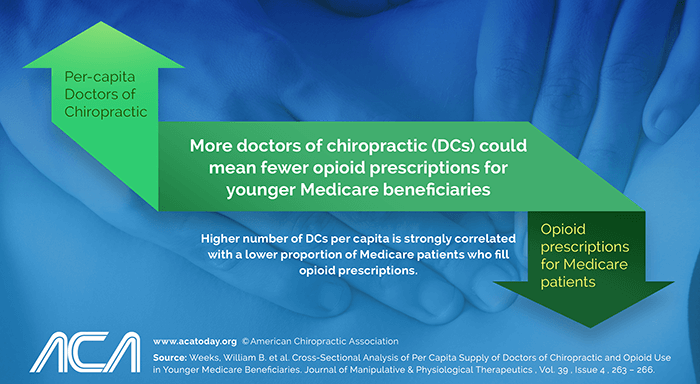
More doctors of chiropractic (DCs) could mean fewer opioid prescriptions for younger Medicare beneficiaries.
Higher number of DCs per capita is strongly correlated with a lower proportion of Medicare patients who fill opioid prescriptions. If you currently have back pain, neck pain, or need a chiropractic care in Houston, please consult with your local Houston chiropractor – Dr. Beecher. Natural solutions can be had like chiropractic for opioid prescriptions.
Neck Pain Causes and Chiropractic Treatment
Houston Chiropractor Comments: What are some common neck pain causes? Neck pain is a very common complaint that chiropractic has been found to be very effective in treating.
Common Neck Pain Causes
There are many neck pain causes including posture related (such as a forward head carriage) and repetitive strain (such as long static holding of awkward positions). These two causes are very similar as the head weighs approximately 15 pounds and when held in a forward translated position for a lengthy time frame, the muscles fatigue and begin to ache. This is similar to holding a baby in your arms for a long time frame. We soon find ourselves moving the baby to the other arm or against our chest due to the gradual increasing strain placed our upper quarter muscles. Hence, we must similarly change the forward head position when we are working at the computer, listening or talking (especially if the person is not directly in front of you), reading a book, cooking, and so forth.
Another cause of neck pain is trauma. This could be neck pain from whiplash caused by a car accident, a slip-and-fall injury, sports injury, and more. These injuries are highly variable as no two injuries or accidents are the same and, there are a wide variety of neck sizes in both length and girth and hence, the same trauma may hardly result in an injury in one person and greatly injure a smaller, more petite person. Your doctor of chiropractic will ask you about the “mechanism of injury” as that can give us clues about which tissues are injured. For example, in a motor vehicle collision, if the impact occurs from the side verses the rear end of the car, the tissues in the neck are stretched differently and the management/treatment may vary accordingly.
Other neck pain causes include a “slipped” or herniated disk. A herniated disk is like a jelly donut where the jelly leaks out and presses against a nerve that travels down the arm. Symptoms often include pain, numb, tingling, burning, weakness, or combinations of these sensations down the course of the nerve. When this occurs, the person is usually quite specific about where the pain is traveling such as, “…it goes down my arm to my ring and little finger.” Dr. Beecher can offer chiropractic herniated disc neck treatment as well.
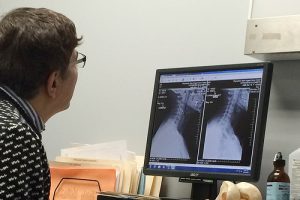
Another cause can be related to natural aging process involving the “wearing out” process of the disk, joints, and muscle/ligament attachments. The term, “osteoarthritis” is commonly associated with these findings and is often blamed for neck pain, but this is controversial. First, osteoarthritis (OA) takes years to develop and many people have a significant amount of OA but literally no pain or symptoms while others with only a little x-ray evidence of OA present with an abundance of pain.
Your Neck Pain Causes and Chiropractic Treatment
So, how do chiropractors manage all of these causes of neck pain? A thorough history, examination, and locating the positions of pain production verses pain relief are “key” to the successful management of patients with neck pain. For one patient, traction/stretching types of manual adjustment techniques work best while for the next, this may not be tolerated at all, which is why we “pre-position” the patient prior to administering an adjustment.
Other chiropractic treatment for neck pain considerations may include exercise instruction, physical therapy modalities (electric stim, ultrasound, etc.), the use of ice, re-adjustment of a computer monitor or work set up and nutritional considerations. If you, a family member or a friend require care, we sincerely appreciate the trust and confidence shown by choosing our service.
Dr. Ward Beecher practices at Beecher Chiropractic Clinic at 1001 Pineloch, Ste 700 Houston, TX 77062. You can schedule an appointment at BeecherChiropractic.com or by calling (281) 286-1300. If you have any questions regarding this blog, please comment below!
The Body & Mind and Connection of Whiplash?
Clear Lake Chiropractor
Clear Lake Chiropractor Comments: The term “whiplash” refers to an injury to the neck muscles, the muscle attachments (tendons), ligaments, and sometimes the disks that lie between the vertebral bodies of the spine. In a rear-end collision, the cause of whiplash occurs from a sudden, rapid acceleration of the body and neck as the car is pushed forwards. In these first moments following impact, the head remains in the same place while the body is propelled forward. This is followed by a “crack-the-whip” movement of the head and neck when the muscles in the front of the neck stretch like rubber bands and suddenly spring the head forwards, all occurring in less than 1 second. The force on the head and neck is further intensified if the seat back is too springy, or angled back too far. Also, if the headrest is too low, the head may ride over the top and more injury can result.
Treatment of whiplash
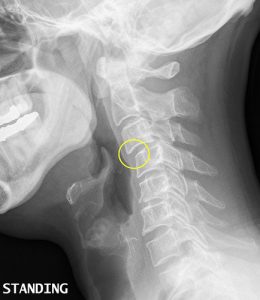
The treatment of whiplash varies from “watchful waiting” to a multidisciplinary team approach that includes neurology, physical therapy, chiropractic, psychology, and possibly surgery (rare). In an article published in the American Journal of Physical Medicine and Rehabilitation, the relationship between clinical, psychological and functional health status factors was investigated in a group of patients with chronic whiplash-associated disorder (WAD). A total of 86 patients with chronic WAD participated in the study and outcomes were tracked using questionnaires that measure pain, disability and psychological issues including depression, anxiety and catastrophizing. Physical examination factors included measuring the cervical range of motion. An analysis of the degree of neck disability and the relative contribution of physical vs. psychological factors revealed catastrophizing and depression played greater roles than did cervical range of motion. This suggests psychological factors play an important role in the outcome of whiplash.
Finding a Chirpractor
The importance of this is that more than just the physical factors like range of motion should be focused on when treating chronic whiplash patients. Answering the patient’s questions, explaining the mechanism of injury and how that relates to their specific condition, and addressing depression, anxiety, coping, and other psychological issues is very important. Discussing treatment goals with patients is also very important. For example, making light of the injury by stating something like, “…you’ll be fine after the treatments,” may harm the patient as anything short of “fine” may be interpreted as failed treatment by the patient. It is also important not to paint too dismal of a picture as that can have negative psychological effects as well, as this may suggest that they will never improve. Explaining the difference between “hurt” and “harm” is of great value to the chronic whiplash patient as they are often told, “if it hurts, don’t do it.” This sends an unfortunate message to the patient that any activity where an increase in pain occurs is “bad” when in fact, that activity may help the patient get better in the long run. This can make or break an acceptable outcome as many may feel like they shouldn’t do anything and this can lead to unemployment, boredom, and the many psychological issues previously described. The best advice is to remain active and try to ignore discomfort by staying within “reasonable activity boundaries.” Reasonable activity tolerance is learned as time passes and trying different activities for different lengths of time. This type of coaching should be at the center of chronic whiplash management rather than over focusing on physical factors such as range of motion. If you would like to know more about whiplash or would like treatment, please contact your Houston chiropractor, Beecher Chiropractic!
The Neck and Headache Connection
The Neck and Headache Connection
Clear Lake Chiropractor Comments: Patients with headaches also commonly complain of neck pain. This relationship is the rule, not the exception and therefore, treatment for headaches must include treatment of the neck to achieve optimum results. The term, “cervicogenic headaches” has been an accepted term because of the intimate connection between the neck and head for many years. There are many anatomical reasons why neck problems result in headaches. Some of these include:
- The first 3 nerves exiting the spine in the upper neck go directly into the head. They penetrate the muscles at the top of the neck near the attachments to the skull and therefore, any excess pressure on these nerves by the muscles or spinal joints will result in irritation and subsequent pain.
- The origin or nucleus of the 5th cranial nerve called the Trigeminal, innervates the sensation to the face and is located in the upper cervical region near the origin of the 2nd cervical spinal nerve, which innervates sensation to the back of the head up to the top. Therefore, problems located in the upper neck will often result in pain radiating up from the base of the skull/upper neck over the top of the skull to the eyes and /or face.
- The 11th cranial nerve that innervates the upper shoulders and muscles in the front of the neck arises from the top 5 to 7 spinal cord levels in the neck. Injury anywhere in the neck can result in spasm and pain in these large muscle groups.
- Other interconnections between the 2nd cervical nerve and trigeminal/5th cranial nerve include communication with the 7th cranial / facial nerve, the 9th cranial / glossopharyngeal nerve, and the 10th cranial / vagus nerve. These connections can affect facial muscle strength/movements, taste, tongue and throat movements, and stomach complaints such as nausea from these three cranial nerve interconnections, respectively.

Headache flickr photo by Peter Hellberg shared under a Creative Commons (BY-SA) license
When patients seek treatment for their headaches, a thorough examination of the neck, upper back, and cranial nerves is routinely performed for the above reasons. It is common to find upper cervical movement and vertebral alignment problems present in patients complaining of headaches. Tender points located between the shoulder blades, along the upper shoulders, on the sides of the neck and particularly, at the base of the skull are commonly found. Pain often radiates from the tender point over the top of the skull when pressure is applied in the upper neck/base of the skull area. Tenderness on the sides of the head, in the temples, over the eyes, and near the jaw joint are also common. Traction or pulling the head to stretch the neck is often quite pain relieving and this is often performed as part of the chiropractic visit and can also be applied at home with the use of a home cervical traction unit. Chiropractic adjustments applied to the fixated or misaligned vertebra in the upper neck often brings very satisfying relief to the headache sufferer. Exercises that promote movement in the neck, as well as strengthening exercises are also helpful in both reducing headache pain and in preventing occurrences, especially with stress or tension headaches.
Dr. Ward Beecher practices at Beecher Chiropractic Clinic at 1001 Pineloch, Ste 700 Houston, TX 77062. You can schedule an appointment with a Clear Lake chiropractor by calling (281) 286-1300. If you have any questions regarding this blog, please comment below!
Your Neck is Your Life Line
Chiropractor in Clear Lake Comments: The nervous system is the master control network for your body, directing virtually every function and action, from monitoring your life needs, to precisely responding to threats to your health.
Each system, from your heart and blood vessels, to your digestive and immune systems, is directed through nerve impulses originating in your brain or spinal cord that travel through its protective bony structure: the spinal column.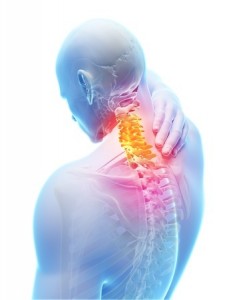
The neck region is the most vulnerable region of the spine to injury. Indeed, even death can be brought through significant trauma to the neck. When the trauma is not fatal, the consequences can still be severe, such as when paralysis strikes.
Most people will not experience these severe injuries, however sprains of the delicate ligaments with subluxation (misalignment) do commonly occur. Despite the injury being smaller, their location (the neck) makes their impact more profound. Functions throughout the body can be impaired when the nerves in the upper neck are compromised.
Within chiropractic, there are specialists who focus their entire care on the uppermost two vertebrae of the spine.
Because every nerve passes through the neck, if irritation or compression is present, virtually any system of the body can be affected. The point being is that a neck disorder will not necessarily just cause neck pain or headache. Dizziness, digestive problems, fatigue, high blood pressure and generally reduced quality of life are some of the symptoms patients commonly experience.
If you have suffered a severe whiplash, you may have noticed far more than neck pain or a stiff neck. Indeed, recent research suggests whiplash needs to more thought of as a whole body disorder.
We take these injuries in our office and address them in both a specific and comprehensive manner. Most patients who have suffered a neck trauma will require x-rays to analyze the posture of their spine. X-rays may also need to be taken in motion to test the stability of your ligaments and to determine precise levels of impaired movements. Without this road map, it is difficult to determine how care should be directed and factors that could influence your long-term prognosis, such as degeneration.
Our health care team is dedicated to drugless natural methods to restore vitality. We try to work with your body with techniques that don’t carry the all too common side effects commonly seen with long-term drug use or surgery. If you’re suffering from neck pain in Houston, we will provide the relief you need and take steps to prevent further damage to your neck and spine.
Dr. Ward Beecher practices at Beecher Chiropractic Clinic at 1001 Pineloch, Ste 700 Houston, TX 77062. You can schedule an appointment with the best chiropractor in houston by calling (281) 286-1300. If you have any questions regarding this blog, please comment below!
Could Neck Problems Be Affected By Your Posture?
Clear Lake Chiropractor Comments: While most of us have a look in the mirror at least once a day, few of us look at our appearance from a different angle, such as from the side. But, the view from the side can be quite revealing if you suffer from chronic neck pain in Houston.
First, note the position of your head in relation to you shoulders. Is it right above the shoulders or does it lean forward from your chest? If it does, this would be called forward head posture, and can come from a problem in your neck. Lower areas of your spine can also cause this problem. Some of us have increased our weight over the years with much of it added to our abdominal region. Because of this increased core weight, the body must counter-balance the weight gain by causing the lumbar spine to “sway- back.”
While this “sway-back” problem can create pain in the lumbar spine, it can also have far reaching effects in the posture of the neck. Usually someone with a protruding stomach and sway back will have somewhat rounded shoulders and a forward head posture. If treatment is only directed at the neck without considering how other areas may affect the stability of the neck, then the results may be less than optimum.
In an accident, many areas of the body can potentially be injured.
As a chiropractor, I not only look at your primary injuries but also how mechanically one area of the spine can affect a distant area. These more distant areas can cause neck pain by referral or they can impede complete recovery because the body is compensating for abnormal posture or movement elsewhere.
X-rays of the full spine can show this abnormal posture as can a detailed postural analysis from our office.
So do you like what you see when you view your posture from the side? If your posture leaves something to be desired, or you’re wondering whether your neck problem could be improved by changing another part of your spine, then it is important to be thoroughly checked. Just examining the neck after a whiplash may leave some injuries undiscovered. Are there tender spots in other areas of the spine? Does your overall upright posture seem lacking?
Dr. Ward Beecher practices at Beecher Chiropractic Clinic at 1001 Pineloch, Ste 700 Houston, TX 77062. You can schedule an appointment at BeecherChiropractic.com or by calling (281) 286-1300. If you have any questions regarding this blog, please comment below!
Whiplash Problems Down the Road
To download a copy of this newsletter, please click here.
Clear Lake Chiropractor comments: Whiplash injuries of the neck and spine commonly occur in motor vehicle collisions. Even minor impacts with little vehicle damage can put significant stress on the spinal ligaments, disks, and delicate nerves. Some people get symptoms right after the accident (which is a very bad sign) but most people feel somewhat unscathed, at least initially.
It’s important to think how spinal injuries can affect you over the long term. When ligaments are injured, there can
be substantial changes over the years, such as arthritis and disk degeneration.
A study in the science journal SPINE (Dec. 15, 1994) looked at fifty patients with MRI and bending x-rays, one and five years after injury. The researchers found that neck pain persisted in 24/50 (48%) patients and radiating pain developed within 6 weeks in 19 patients or 38%. Radiating pain occurs when a disk protrudes and bulges onto a nerve root exiting your spinal column. In patients with these persistent symptoms, the MRI was helpful in showing the disk injury.
Although surgery is considered by many, most patients do well under conservative, even minimal care. It’s important to consider non-surgical options first, since surgery does entail substantial risks, and how well it works is also subject to debate.
X-rays and palpation are used to see the posture of your neck and how the vertebrae move in stressed positions. These tests can help determine how your spine functions and whether the disk is injured and/or also if you have pre-existing signs of arthritis, which can impair how you resist and recover from trauma.
Chiropractic adjustments are directed at reducing pain and improving mobility in spinal areas that are blocked. In general it’s important to keep your neck moving while you recover. Staying in bed and not moving the spine at all are not advised since this can impair recovery. Even patients with severe injuries can have some movements preserved and these should be encouraged.
Because symptoms and even disk disease can show up later, it is important to have a detailed neurological examination following a neck injury. Whiplash trauma is significant, especially when you consider how many patients still suffer years down the road with neck and arm pain. Getting diagnosed properly is the first step to determining what type of care will be best for you.
Dr. Ward Beecher practices at Beecher Chiropractic Clinic at 1001 Pineloch, Ste 700 Houston, TX 77062. You can schedule an appointment at BeecherChiropractic.com or by calling (281) 286-1300. If you have any questions regarding this blog, please comment below!


